entire issue [pdf 2.79 mb] - Pitt Med - University of Pittsburgh
entire issue [pdf 2.79 mb] - Pitt Med - University of Pittsburgh
entire issue [pdf 2.79 mb] - Pitt Med - University of Pittsburgh
You also want an ePaper? Increase the reach of your titles
YUMPU automatically turns print PDFs into web optimized ePapers that Google loves.
DEAN’S MESSAGEPITTMEDPUBLISHERArthur S. Levine, MDEDITOR IN CHIEFErica LloydART DIRECTORElena Gialamas CerriSENIOR EDITORChuck StaresinicASSOCIATE EDITORJoe MikschPRODUCTION COORDINATORChuck DinsmoreSTAFF CONTRIBUTOREmily KaramOBITUARIES CONTRIBUTORMacy Levine, MD ’43CIRCULATION MANAGERCrystal KubicCHIEF EDITORIAL ADVISORKenneth S. McCarty Jr., MD, PhDEDITORIAL ADVISORSEdward Barksdale Jr., MDPaula Davis, MASusan Dunmire, MD ’85, Res ’88Jonathon Erlen, PhDJoan Harvey, MDJohn Horn, PhDSteven Kanter, MDJoan Lakoski, PhDDavid Lewis, MDMargaret C. McDonald, PhDRoss Musgrave, MD ’43David Perlmutter, MDKevin Proctor, Class <strong>of</strong> ’09Gabriel Silverman, Class <strong>of</strong> ’09Peter Strick, PhDGerard Vockley, MD, PhDSimon Watkins, PhDMarshall Webster, MD, Res ’70Julius Youngner, PhDOFFICE OF PUBLIC AFFAIRSRobert HillJohn D. Harvith, JDBeauty is unbearable, drives us todespair, <strong>of</strong>fering us for a minutethe glimpse <strong>of</strong> an eternity thatwe should like to stretch out overthe whole <strong>of</strong> time.—Albert CamusIn this <strong>issue</strong> <strong>of</strong> the magazine, a writer exploreshow physicians may fail to interact effectively withterminally ill patients and their families (“TheModern Deathbed,” p. 18). I know from my ownexperience as an oncologist how difficult it can be to relate squarely with families whoare desperate for miracles. For instance, imagine how flummoxed a young doctor couldbecome if a dying patient asked, “Just between you and me, Doc, we’re going to kick thisthing, right?” So why don’t doctors handle these situations more skillfully?The question makes me think <strong>of</strong> a talk Fadi Lakkis gave recently. Dr. Lakkis is the scientificdirector <strong>of</strong> the Thomas E. Starzl Transplantation Institute. He noted that, in the lab,sponges retrieved from the deep sea can be induced to fuse together into one organism ifthey are genetically identical. If they are genetically distinct, however, they repel one another(“innate immunity”). For 800 million years, this primitive ability to recognize “nonself”has been vital to the sponge’s self-preservation. The ability is critical to the most basic <strong>of</strong>biological needs—to reproduce one’s genes and thereby to sustain one’s “identity.” Fusingwith another organism—even one <strong>of</strong> the same species—would permit the possibility thatthe organism might pass on the genes <strong>of</strong> another invading organism, diluting or even extinguishingthe very identity that might otherwise <strong>of</strong>fer a “glimpse <strong>of</strong> eternity.”The immunology <strong>of</strong> sponges may seem leagues away from what takes place in our discussionsin the ICU. Yet I submit that our instinct for preserving our identity is likewiseconserved by millions <strong>of</strong> years <strong>of</strong> evolution. Moreover, as the renowned social anthropologistErnest Becker has written, “the wellspring <strong>of</strong> all human activity is the fear <strong>of</strong> dying.”Absent our sense <strong>of</strong> these pr<strong>of</strong>undities, we cannot care for our patients with wisdom.When we see our patients dying, we must confront our own mortality. At the NationalCancer Institute, where I was an attending physician years ago, oncology fellows admitted,after some prodding, that they avoided their dying patients. Sometimes they unknowinglyidentified with them. Sometimes they were angry with them. The last thing young doctorswanted to do was to enter into meaningful discussions with terminally ill patients and theirfamilies that would stray from the reporting <strong>of</strong> medical facts—discussions that might touchon a parent’s guilt or a patient’s fear, for example.But, as those oncology fellows learned, when physicians don’t run from their patientsand instead come to see a patient’s experience as a guide to confronting their own mortality,the rewards are pr<strong>of</strong>ound. We come to know our patients and ourselves at a deeperlevel, and we become better doctors.Camus also said, “It is normal to give away a little <strong>of</strong> one’s life in order not to lose it all.”JULIA MAROUS STRAUT<strong>Pitt</strong> <strong>Med</strong> is published by the Office <strong>of</strong> the Dean and Senior ViceChancellor for the Health Sciences in cooperation with the alumniand public affairs <strong>of</strong>fices. It is produced quarterly for alumni, students,staff, faculty, and friends <strong>of</strong> the School <strong>of</strong> <strong>Med</strong>icine. PR 5998The <strong>University</strong> <strong>of</strong> <strong>Pitt</strong>sburgh is an affirmative action, equalopportunity institution. © 2007, <strong>University</strong> <strong>of</strong> <strong>Pitt</strong>sburghArthur S. Levine, MDSenior Vice Chancellor for the Health SciencesDean, School <strong>of</strong> <strong>Med</strong>icine2 PITTMED


![entire issue [pdf 2.79 mb] - Pitt Med - University of Pittsburgh](https://img.yumpu.com/50435398/4/500x640/entire-issue-pdf-279-mb-pitt-med-university-of-pittsburgh.jpg)
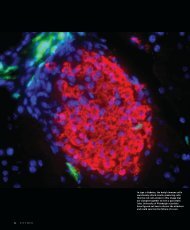
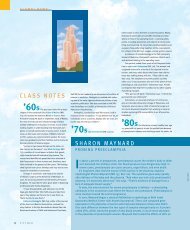
![entire issue [pdf 6.47 mb] - Pitt Med - University of Pittsburgh](https://img.yumpu.com/50360689/1/190x231/entire-issue-pdf-647-mb-pitt-med-university-of-pittsburgh.jpg?quality=85)
![entire issue [pdf 12.7 mb] - Pitt Med - University of Pittsburgh](https://img.yumpu.com/49831615/1/190x231/entire-issue-pdf-127-mb-pitt-med-university-of-pittsburgh.jpg?quality=85)
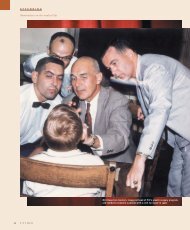
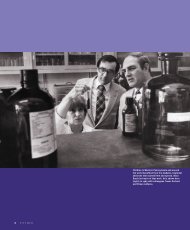
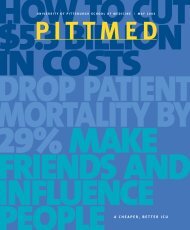
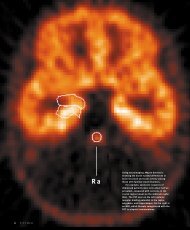
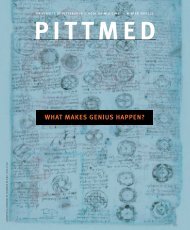


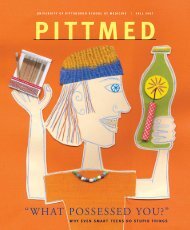
![entire issue [pdf 11.3 mb] - Pitt Med - University of Pittsburgh](https://img.yumpu.com/46685830/1/190x231/entire-issue-pdf-113-mb-pitt-med-university-of-pittsburgh.jpg?quality=85)
![entire issue [pdf 12.7 mb] - Pitt Med - University of Pittsburgh](https://img.yumpu.com/44997419/1/190x231/entire-issue-pdf-127-mb-pitt-med-university-of-pittsburgh.jpg?quality=85)